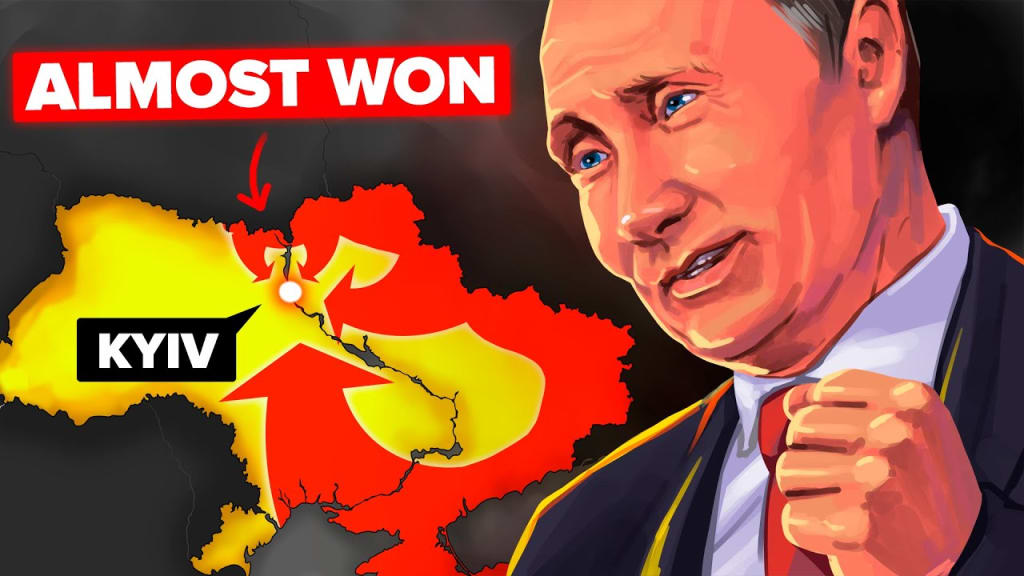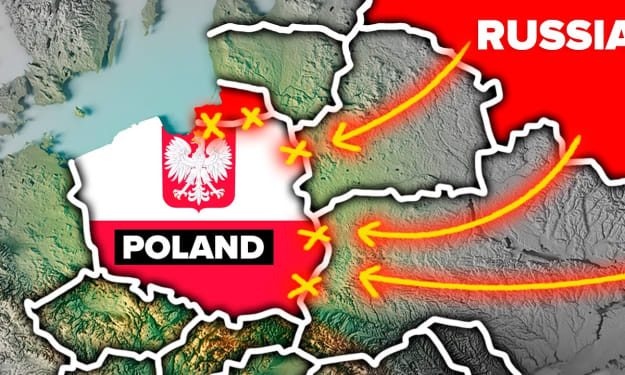How Did Putin Almost Win the Ukraine War?
Vladimir Putin was confident that by seizing Kyiv, Russia would win the war in Ukraine within days. Then he was certain that Russia would triumph by laying siege to cities throughout the country. He now appears to be confident that Russia will be able to hold southern Ukraine long enough for draftees, munitions, and troops to reach his soldiers before a Ukrainian onslaught can break through his lines. Putin was on the verge of victory at the start of the conflict. Putin is getting closer and closer to defeat with each passing day. 🔊📢🤔🥱😴🔊📢

Vladimir Putin was confident that by seizing Kyiv, Russia would win the war in Ukraine within days. Then he was certain that Russia would triumph by laying siege to cities throughout the country. He now appears to be confident that Russia will be able to hold southern Ukraine long enough for draftees, munitions, and troops to reach his soldiers before a Ukrainian onslaught can break through his lines. Putin was on the verge of victory at the start of the conflict. Putin is getting closer and closer to defeat with each passing day. 🔊📢🤔🥱😴🔊📢
Tanks from the T-72 series are moving quickly toward Kiev. Both civilians and members of the resistance are fired upon by Russian troops. Special Forces soldiers approach Ukrainian defenses from behind. When Russia and Ukraine first started fighting, it appeared that Russia would prevail. Vladimir had all the advantages. But almost a year later, his invasion will be remembered as among the most significant military blunders ever. What went wrong Lack of knowledge, poor communication, and drug use? Vladimir Putin, the president of Russia, declared on February 21, 2022 that the Ukrainian regions of Luhansk and Donetsk were independent states that wished to secede from Ukraine and join Russia. The majority of countries, including Ukraine, did not accept this declaration.
But Putin didn't care because this was just the beginning of his invasion of Ukraine. Putin asserted that he needed to send Russian troops into these regions of Ukraine in order to maintain peace in the area. He was actually just putting his troops in place for the impending battle. Putin asserted that most of the residents of Luhansk and Donetsk identified as Russian and desired to be reintegrated into the motherland. Later, rigged elections would be held, forcing voters to decide whether to break away from Ukraine and join Putin's Russian Empire while being held at gunpoint. In this chain of events, it's crucial to remember that Vladimir Putin crafted a narrative suggesting that the majority of Ukrainians desired reintegration while yearning for the good old days of the Soviet Union.
Of course, this wasn't the case. Putin hoped that by fabricating this fictitious story, it would eventually be realized. The mad dictator may have actually believed his own lie, judging by the decisions he made after that. Putin may have believed that Russia could simply invade Ukraine, seize the capital, toppling the current administration, and the people would then welcome him with open arms. We know that Putin is insane, but there are some very real reasons he may have held that belief. He likely thought this first for the reason that Putin has surrounded himself with allies and friends who will tell him what he wants to hear. Putin's inner circle would all tell him, if he had confided in them about his desire to invade Ukraine, that not only was it feasible, but the Ukrainians would also welcome the chance to be returned to the Russian Federation.
Military generals and people outside of Putin's immediate circle cautioned him that capturing Ukraine would be more challenging than he anticipated and require a lot of planning, but this is not who Putin listened to. Putin may have been under the influence of drugs when the initial invasion was planned, according to a recent statement from Danish intelligence, which is another more unexpected reason why he believed the war would end in his favor. Vladimir Putin may be taking hormones to treat thyroid cancer, which could have affected his mental state, according to a Danish official who made the claim in an anonymous statement. This analyst specifically proposed that Putin's delusions of grandeur, which are a known side effect of hormone therapy, may have been caused by the treatment.
If this is accurate, the decision to invade Ukraine might have been influenced by a drug-induced fantasy. Vladimir Putin, however, has shown in the past that he doesn't require drugs to invade a neighbor, according to those actions. The dictator probably desired to include Ukraine within the borders of Russia in order to increase his authority and realize his idea of a new Russian Empire. It probably didn't help, though, if Putin was under the influence of drugs. On paper, the Russian military appears to be vast and equipped with some of the most cutting-edge weapons available. And while some of this is accurate, being strong on paper differs from being strong in real life.
If statistics were all we had, Russia would have annihilated Ukrainian forces early on in the conflict. And it appeared to be happening during the initial attack. Ukrainian President Volodymyr Zelenskyy pleaded with everyone to maintain calm when Putin dispatched troops to Luhansk and Donetsk. He thought the Ukrainians would be able to stand up to Vladimir Putin's despicable behavior. Zelenskyy most likely also thought NATO would intervene to support Ukraine. Western countries continued to be distant, though, which only served to confirm Russia's perception that Ukraine would be a simple target. Putin was granted permission to use military force outside of Russia on February 22 by the Russian parliament. Putin and his allies control the parliament, so whatever they want, they get, so this decision was just a formality.
As a result, many NATO countries imposed economic sanctions on Russia. Putin's invasion strategy was based on his military seizing Kyiv, toppling the Ukrainian government, and reunifying the region with Russia all within a few days. So, there was little cause for alarm regarding the sanctions. The invasion got under way on February 24. Any Ukrainian who is willing to defend their nation is encouraged to step forward, according to President Zelenskyy, who has ordered a general mobilization of the nation. Vladimir Putin had a different impression of the Ukrainian people than the majority of them, who were ready to fight for their independence. The Ukrainian people enlisted in the military, took up arms when the invasion began, and started fighting back against the Russian invasion that was pouring over their borders.
But over the following few days, it appeared that Russia would easily win the war and that there would be no more hope. Russia had more soldiers, vehicles, aircraft, and missiles than Ukraine could ever hope to gather. The Ukrainians appeared to have little to no support from NATO and were outmanned and outgunned. These elements nearly contributed to their defeat in the early stages of the invasion. However, as we now know, Ukraine would not go down without a fight, and despite all the odds, they would succeed in a number of goals that would prevent Russia from winning the war in the initial stages of the invasion. Russian forces roared through Belarus and toward Kiev as the rest of the world watched in horror. Rightfully so, this was Russia's primary target.
There is a good chance that the war could have ended immediately if Kyiv had fallen and the Ukrainian government had been forced to flee, with Russia installing a pro-Putin puppet in power. Due to this, the situation appeared bleak as Russian soldiers advanced toward Kiev. In addition, Russian forces were advancing into southern Ukraine through the Crimea, which they had annexed in 2014, as well as from southeast of the Russian border. The battles in the north were far more important than the initial success of these forces. The destruction of the Ukrainian government through the capture of Kyiv was the only way for Russia to end the conflict quickly.
Putin's initial strategy might have called for his southern forces to eventually converge on Russian forces in the north, but they never made it that far. However, this would have taken too long if the southern battalions couldn't quickly advance through the center of Ukraine. The only way the war could have been over quickly was if Putin's northern invasion force had been successful. To prevent any escape to the west, Russian vehicles fired down the west bank of the Dnipro River. To join the Russian forces advancing from the east, one force moved down the Dnipro's opposing bank. Up until they arrived in Kyiv, the initial invasion forces crushed any resistance they encountered.
The capital was to be surrounded by Russian tanks and soldiers traveling along the Dnipro. If they had been successful, the war probably would have ended there and then. On the other hand, the northernly advancing Russian forces failed to accomplish this goal. Taking Kyiv within the first week or two was crucial to Putin's invasion strategy. And Putin must have experienced a sinking feeling in his stomach as the days went on without any mention of a victory. His invasion was met with hostility by the Ukrainian people, the invasion moved more slowly than Russian intelligence had predicted, and the Ukrainian military mounted a massive resistance.
Russian had a chance to win the war even with all of these things going wrong. Russia continued to have a significant number of tanks and pieces of artillery moving in the direction of Kiev during the initial assault. Paratroopers dropping into the capital to cause havoc from within were meant to complement the mechanized ground assault. However, miscommunication and incompetence played a role in the failure to take Kyiv, just like they did in many of Russia's defeats during the war. The Russian military is organized in such a way that communication between the various ground units was disrupted—not due to technical issues. Each force was given a set of goals, but no backup plan was given in case they encountered opposition.
The Russian military is organized to launch powerful firepower at a target, then to dig in and hold the line. This strategy doesn't really work if your goal is to push through a nation to seize a capital that is hundreds of miles away. Russian tanks and other vehicles encountered resistance almost immediately as they attempted to reach Kiev. Their advance was slowed by this, and confusion resulted from a breakdown in communication between military commanders, the government, and Russian soldiers. As a result, entire battalions were rendered helpless or found themselves in the wrong place at the wrong time. Russian forces might have been able to avoid the Ukrainian forces and continue their advance toward the capital if there had been clear instructions on how to handle the unexpected resistance.
But due to antiquated strategies, numerous tanks, infantry, and artillery units got caught up in skirmishes that slowed their advance and helped the Ukrainian military more successfully defend their capital. Russia could still win the war if they made it to Kyiv at this point. To begin with, though, they needed to put in place another crucial element of their invasion. The Russian military is not intended to deviate too far from supply routes. Because of the constant resupply requirements of the equipment and strategies it employs, supply chains and railroads play a significant role in Russian war strategy. It is possible that Russian artillery and tanks could have bombarded Kyiv while soldiers advanced deeper into the capital to coerce Ukraine to submit if Putin's forces had been able to secure supply routes from Russia to Kyiv.
They needed to capture two significant airfields, Antonov Airport and Vasylkiv Air Base, both of which were nearby Kyiv. The two airfields faced fierce resistance when Russian forces attacked them. This caused them to move more slowly than they already had. Putin must have realized he was in trouble when Kyiv wasn't captured within the first two weeks of the invasion. But it didn't seem to matter enough for him to switch up his approach. Because of its much larger military, ability to resupply this quickly advancing force, and ability to reach the northern outskirts of Kiev, Russia came very close to winning the war.
By all accounts, if the invasion had been planned properly, Russian soldiers and armor should have been able to advance all the way into Kyiv and take the city for themselves. Despite the fact that Putin was operating on faulty intelligence, the sheer size of the Russian military should have been sufficient to crush any resistance the much more modest Ukrainian military could muster.






Comments
There are no comments for this story
Be the first to respond and start the conversation.